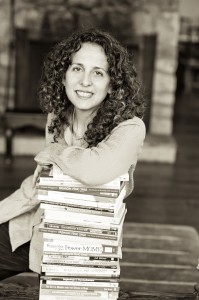
This post is inspired by Bring Your Book to Life Program participant Lori Williams who came to me, in her words, “Pregnant with a book.” She felt impassioned to write a memoir, yet when we spoke about her goals and dreams she expressed real pressure from her controlled remote viewing students to write a how-to book–and a personal desire to share the techniques she teaches nationally with a wider audience.
We settled on the how-to book as the first book–it would certainly be easier to get that one complete and into the world and she felt a strong need for it. However, when she sent me her outline, the book seemed a bit schizophrenic. Several chapters of memoir followed by some how-to chapters. I encouraged her to write the how-to book with, perhaps, a strong memoir element.
She wrote me back to say, she had been trying to squeeze it all into one book because the idea of two intimidated her, but she’d finally come to terms with the need to write two good books rather than one forced one.
“After reading your comments on my outline, I do believe I have two books in me. I need to write them both. That way, the memoir is the memoir and the how-to is the how-to. Each one with a specific audience. My students are clamoring for both. They tell me that my stories help them immensely, as I use the stories in class to illustrate various lessons.”
Are you struggling with your book and what to put in? Are you pulled in more than one direction? It may not even be a case of a memoir and a how-to book, but perhaps two different how-to books. Or two memoirs. Or similar books for different audiences.
If you find yourself going in circles and having trouble either 1) finding a consistent voice 2) having a consistent form from chapter to chapter or 3) writing a memoir on several different themes, consider whether you have more than one book in you.
Another related issue that comes up for emerging authors is starting on one book only to find ideas for another book cropping up. Often, though not always, I find that this can be a bit of self-sabotage–a way to work on several books but not finish any.
Take time to ask yourself which is the book you most want to write and which is the one that needs to come first based on your goals, ease of writing, marketability and any other factors that are important to you. Then, if other ideas come up, make a few short notes and put them in a file for when it’s time to work on the next book.


My friend, novelist Padma Venkatraman recently shared that a chapter of her multi-award- winning novel Island’s End began with a voice in her head. She took dictation from that voice and then put it away to complete her first novel–another award winner–Climbing the Stairs. When that was complete, she took up Island’s End. I like her process–take dictation if the inspiration comes, but don’t let it derail you from finishing your first book.
It’s much more satisfying to be a published author than to have many half-finished manuscripts around the house!
What are your biggest book-writing challenges? Any insights to share as well?



Thank you for this post, Lisa. I like your suggestion to listen to the voice of inspiration without letting your other projects slip. Lately I’ve been thinking that blogging can be a useful way to explore and experiment while keeping focussed on a larger project.
Yes. I love how blogging keeps me writing (and thinking about writing) in short bursts.
This is so helpful–I find myself “boiling over” with extra material often–and so do the people I coach. This is a great way to tell when these are actually two books or a book and supplementary material!
Dear Lisa,
Your call meant so much. I appreciate the guidance. I will begin with the tools you mentioned.
I so relate to the over-abundance issue here. I need direction and clarity. I need a system to sort it all; to move it through me with some kind of grace; to allow it life elsewhere; even while the problems at play continue to surround my life.
It’s a great challenge. I feel I’ve made a small start.
Thanks again.
I’m so happy, Nancy, that you are finding a way to transform all the awful things that happened and make something positive of it. I think you will find your book both healing and powerful for yourself and for your readers. Let me know if you have questions as you work through the materials.
It’s so rewarding to see some of my favorite bloggers here commenting–Ginger, Dylan…